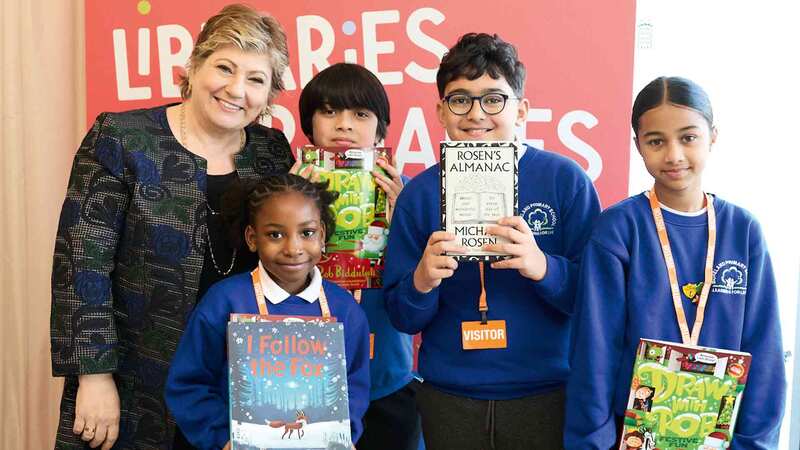You are viewing your 1 free article this month. Login to read more articles.
'War on social cohesion': Finch slams community cuts
Dawn Finch, children’s author and president of CILIP, has launched an attack on cuts to community resources, branding them tantamount to a “war on social cohesion and our culture”.
Finch made the comments in her blog, in which she interviewed an anonymous volunteer at a museum about the pressures of taking on a community resource which has been stripped of help or funding from the local council.
The powerful interview exposed the desperation of a volunteer fighting to keep an unnamed museum in England operating with little or no help from the council or arts organisations. The volunteer describes working 40-hour weeks for free while drawing on her diminishing life savings to survive, putting her marriage under strain and having the threat of the museum’s closure hanging constantly over her head.
"My personal main problem is that I’m exhausted", the volunteer told Finch. "I don’t know how much longer I can keep going like this. The museum is open 35 hours a week, and I’m working around 40 hours a week for nothing. I love this museum, and walking away would be devastating, but for my own sanity and health I can’t keep going like this. I’m afraid to stop because I know that if I do the place will start to fail. I’m already living on my savings, and my husband feels it’s all threatening our marriage and our children’s future. This isn’t fair. We shouldn’t have to do any of this."
The volunteer continued: "I don’t think that there is a future for the museum. Without public funding of some form we can’t keep going like this... We are between a rock and a hard place. Behind the scenes we are getting really desperate now, and if I’m honest we don’t know how we are going to open this winter because fuel prices have shot up and the dwindling trust fund can’t take much more. Our heating bill alone could be the straw that breaks the camel’s back.
"The thing that really makes me want to spit blood is that we all know that if the museum fails, the council will make out like it’s our fault. They’ve lied to us all the way down the line by telling us we’d have support and guidance through this process. Now I can’t even get a reply when I call for help and I no longer even know who is supposed to be responsible for being our support contact."
The volunteer added that she would dissuade other volunteer groups from considering running community services. "Honestly? Don’t do it", she said. "We all started with such high hopes and we all wanted to save the museum and make a difference, but it’s been a huge mistake... If I had to give people advice I’d say that time is better spent fighting to keep funding and paid staff. Do whatever you can, fight and fight and fight to keep that funding in place."
The insight into the strains of experienced by volunteers running community services will compound campaigners's fears about the future of libraries, many of which have also been handed over to volunteer and community control following large scale cuts to local councils by the government. In recent times Derby City council has announced plans to hand over 11 libraries to community groups, and in Leicestershire two-thirds of libraries are to be transferred to community groups.
Finch told The Bookseller that she conducted the interview to draw attention to the "increasingly exploitative practice of current volunteer use" and unstainability of relying on volunteers to run community services without funding or support.
"It is up to us all to unite to stop [the erosion of community services]," Finch said. "This should not be a battleground of individual skirmishes, this is a war on social cohesion and on our culture, and we need to join together to raise our voices to stop it before we have lost everything that made our country great."
She continued: "Museums, libraries, art galleries, youth centres, parks, playground, paddling pools, drop-in centres, housebound services, day centres, community centres… these are the glue that binds our communities. These are the things that bring people together and create that sense of community that makes for safer and better lives for all.
"The current austerity cuts that are specifically directed at services like this represent an attack on the links in the chains that unite our communities. These cuts are eroding our culture and society and we, as citizens, are expected to do all the work to keep them going. Those of us who volunteer all the time are expected to carry this entire burden on our weakening shoulders. Good people are being lied to, and then they are expected to take all the responsibility for trying to keep their essential community resources going.”
Urging community members to write to their MPs, sign peitions and speak out against cuts, Finch added: "Above all, don’t let the desperate struggle to protect our community services and resources drive us further apart. Join your community with others, link to other groups and present a united and public front. Divided our voices are hard to hear, united we are impossible to ignore."
Librarians and campaigners across the board are deeply concerned with the over-reliance on volunteers to run library services, with CILIP members voting "overwhelmingly" to oppose the "amateurisation" of the library service which is being caused by the library buildings and contents being run by the local community with little or no funding for professional or paid library staff.
Other campaigners have expressed concern over new libraries minister Rob Wilson's emphasis on using volunteers.
A national library demonstration, which is planned for Saturday 5th November, has been backed by Labour leader Jeremy Corybn. The demonstration, aims to highlight "the clear and present danger" to Britain's public library service.



















